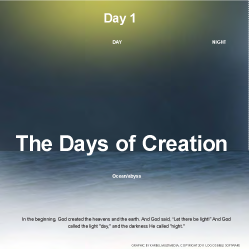4:1–6 Paul continues the defense of his ministry (2:17–7:4). In the previous section, Paul focused on the glory of the new covenant—especially when compared to the old covenant (3:7–18). Here, he claims he has openly proclaimed God’s truth (vv. 1–2) and explains that if his message is hidden, it is because Satan has blinded unbelievers (vv. 3–4). Paul affirms that he is not promoting himself but proclaiming Christ Jesus as Lord (v. 5). |
4:1 this ministry Refers to the ministry of the Spirit and the ministry of righteousness referenced in 3:8–9.
we do not lose heart Despite his hardships and opposition (11:23–29), Paul remains encouraged in his proclamation of the message of reconciliation (5:18). He did not lose heart because God had already won victory (see 2:14 and note) through the resurrection of Jesus (vv. 13–18).
4:2 adulterating the word of God Paul continues to contrast himself with itinerant teachers who preached the Word only for financial gain (2:17; see note on 1:12; compare 1 Tim 6:5) and distorted God’s Word (see 2 Cor 11:4 and note).
4:3 veiled Paul acknowledges that some did not accept the gospel message—not because he obscured or hid anything from them (see 3:12–14), but because they were blinded by the work of evil forces and false teachers (see v. 4). See note on 3:15.
4:4 the god of this age Refers to Satan (compare John 12:31; 14:30; Eph 2:2). Satan further blinds those who refuse to obey the gospel.
image of God Jesus is described as the image of God here and in Col 1:15. Elsewhere, Paul teaches that believers are to conform to the image of Christ just as Christ bears the image of God (Rom 8:29). Compare Phil 2:6 and note.
4:5 do not proclaim ourselves Paul and his companions focused their message on Christ’s divine nature as Lord. Paul’s remark suggests that some “false apostles” were presenting themselves as important rather than as servants (2 Cor 11:13).
4:6 Light will shine out of darkness Paul alludes to the creation account (see Gen 1:3 and note). Just as God created the world, He now makes believers a new creation (2 Cor 5:17).
4:7–18 Having extolled the glory of the new covenant, which he preached (2 Cor 3:7–4:6), Paul now explains his suffering (see 1:6 and note). While believers share in the knowledge of the glory of God (v. 6) and are being transformed into the image of Christ (3:18), they do so in their frail, mortal bodies. Because of this, Paul suffers and faces hardship, but he perseveres (vv. 8–10). He regards this as part of his ministry, since such hardships benefit the church in Corinth (vv. 11–12). Moreover, believers can endure suffering because of the hope provided by the resurrection of Jesus (vv. 14–15). Suffering is temporary and will give way to an eternal glory (vv. 16–18). |
4:7 this treasure Refers to the knowledge of God’s glory (v. 6) and may include the proclamation of this knowledge to the world.
earthenware jars Represents human frailty (Psa 31:12; Isa 30:14). Paul acknowledges God’s power and mercy, which enable him to possess and proclaim the gospel.
4:8 afflicted in every way See note on 1:6.
4:10 death of Jesus Represents the life-threatening situations Paul experienced because of his ministry (Acts 9:16; 14:22; 21:10–14). Paul’s sufferings not only display God’s power (2 Cor 4:7), but also bear witness to the death of Jesus and His resurrected life. This phrase also may include the sufferings of Christ as part of the content of Paul’s gospel message.
4:11 the life of Jesus Refers to the resurrected life of Christ. This promise of life is the source of power and the motivation for Paul to endure hardship. Since he lives in union with Christ, he trusts that God will raise him (2 Tim 2:11).
our mortal flesh Refers to the body.
4:12 but life in you Paul faced opposition when he ministered in Corinth (Acts 18:6), but the Spirit encouraged him to stay and not be afraid (Acts 18:9–10). Consequently, many Corinthians heard the gospel message and accepted it.
4:13 I believed, therefore I spoke Paul quotes Psalm 116:10. Just like the psalmist, his faith enables him to proclaim God’s Word.
4:14 raised Jesus will also raise us The resurrection of the dead is Paul’s hope and motivation for enduring hardship. See 1:9.
of the dead is Paul’s hope and motivation for enduring hardship. See 1:9.
4:15 for your sake Refers to the sufferings mentioned in vv. 8–11. Paul reminds the Corinthians of his servant nature in apostolic ministry, thus presenting them with an example for proper behavior (see 1 Cor 4:16; 11:1).
4:16 we do not lose heart See 2 Cor 4:1 and note.
renewed day after day Believers should continue to grow in the knowledge of God and be transformed into Christ’s image in preparation for His return (see note on Phil 1:6); the Holy Spirit does this work in believers.
 Spirit and Flesh in Paul’s Letters
Spirit and Flesh in Paul’s Letters
4:17 momentary light affliction Hardships are temporary and easier to bear when put in the perspective of eternity. Such hardships do not merit glory; rather, God uses them to display His strength in weakness.
rather, God uses them to display His strength in weakness.
4:18 not looking at what is seen Paul does not focus on his afflictions. Instead, he reflects on God’s promises and the hope of resurrection in Christ (2 Cor 1:20; 4:14).

|
About Faithlife Study BibleFaithlife Study Bible (FSB) is your guide to the ancient world of the Old and New Testaments, with study notes and articles that draw from a wide range of academic research. FSB helps you learn how to think about interpretation methods and issues so that you can gain a deeper understanding of the text. |
| Copyright |
Copyright 2012 Logos Bible Software. |
| Support Info | fsb |
 Loading…
Loading…

